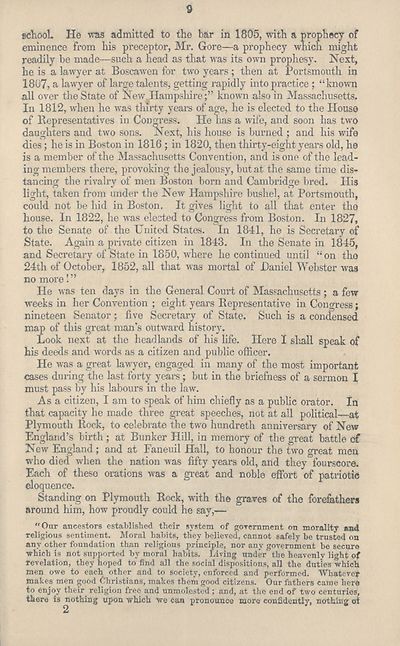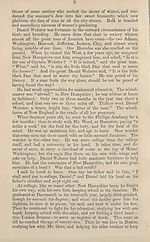Download files
Complete book:
Individual page:
Thumbnail gallery: Grid view | List view

school. He ivas admitted to the bar in 1805, with a prophecy of
eminence from his preceptor, Mr. Gore—a prophecy which might
readily be made—such a head as that was its own prophesy. Next,
he is a lawyer at Boscawen for two years; then at Portsmouth in
1807, a lawyer of large talents, getting rapidly into practice ; “known
all over the State of New Hampshire;” known also in Massachusetts.
In 1812, when he was thirty years of age, he is elected to the House
of Itepresentatives in Congress. He has a wife, and soon has two
daughters and two sons. Next, his house is burned ; and his wife
dies; he is in Boston in 1816; in 1820, then thirty-eight years old, he
is a member of the Massachusetts Convention, and is one of the lead¬
ing members there, provoking the jealousy, but at the same time dis¬
tancing the rivalry of men Boston born and Cambridge bred. His
light, taken from under the New Hampshire bushel, at Portsmouth,
could not be hid in Boston. It gives light to all that enter the
house. In 1822, he was elected to Congress from Boston. In 1827,
to the Senate of the United States. In 1841, he is Secretary of
State. Again a private citizen in 1843. In the Senate in 1845,
and Secretary of State in 1850, where he continued until “on the
24th of October, 1852, all that was mortal of Daniel Webster was
no more! ”
He was ten days in the General Court of Massachusetts ; a few
weeks in her Convention ; eight years Representative in Congress;
nineteen Senator; five Secretary of State. Such is a condensed
map of this great man’s outward history.
Look next at the headlands of his life. Here I shall speak of
his deeds and words as a citizen and public officer.
He was a great lawyer, engaged in many of the most important
cases during the last forty years; but in the briefness of a sermon I
must pass by his labours in the law.
As a citizen, I am to speak of him chiefly as a public orator. In
that capacity he made three great speeches, not at all political—at
Plymouth Rock, to celebrate the two hundreth anniversary of New
England’s birth ; at Bunker Hill, in memory of the great battle of
New England; and at Faneuil Hall, to honour the two great men
who died when the nation wras fifty years old, and they fourscore.
Each of these orations was a great and noble effort of patriotic
eloquence.
Standing on Plymouth Rock, with the graves of the forefathers
around him, how proudly could he say,—
“Our ancestors established their system of goremment on morality and
religious sentiment. Moral habits, they believed, cannot safely be trusted on
any other foundation than religious principle, nor any government be secure
which is not supported by moral habits. Living under the heavenly light of
revelation, they hoped to find all the social dispositions, all the duties which
men owe to each other and to society, enforced and performed. Whatever
mates men good Christians, makes them good citizens. Our fathers came here
to enjoy their religion free and unmolested ; and, at the end of two centuries,
there is nothing upon which we can pronounce more confidently, nothing at
eminence from his preceptor, Mr. Gore—a prophecy which might
readily be made—such a head as that was its own prophesy. Next,
he is a lawyer at Boscawen for two years; then at Portsmouth in
1807, a lawyer of large talents, getting rapidly into practice ; “known
all over the State of New Hampshire;” known also in Massachusetts.
In 1812, when he was thirty years of age, he is elected to the House
of Itepresentatives in Congress. He has a wife, and soon has two
daughters and two sons. Next, his house is burned ; and his wife
dies; he is in Boston in 1816; in 1820, then thirty-eight years old, he
is a member of the Massachusetts Convention, and is one of the lead¬
ing members there, provoking the jealousy, but at the same time dis¬
tancing the rivalry of men Boston born and Cambridge bred. His
light, taken from under the New Hampshire bushel, at Portsmouth,
could not be hid in Boston. It gives light to all that enter the
house. In 1822, he was elected to Congress from Boston. In 1827,
to the Senate of the United States. In 1841, he is Secretary of
State. Again a private citizen in 1843. In the Senate in 1845,
and Secretary of State in 1850, where he continued until “on the
24th of October, 1852, all that was mortal of Daniel Webster was
no more! ”
He was ten days in the General Court of Massachusetts ; a few
weeks in her Convention ; eight years Representative in Congress;
nineteen Senator; five Secretary of State. Such is a condensed
map of this great man’s outward history.
Look next at the headlands of his life. Here I shall speak of
his deeds and words as a citizen and public officer.
He was a great lawyer, engaged in many of the most important
cases during the last forty years; but in the briefness of a sermon I
must pass by his labours in the law.
As a citizen, I am to speak of him chiefly as a public orator. In
that capacity he made three great speeches, not at all political—at
Plymouth Rock, to celebrate the two hundreth anniversary of New
England’s birth ; at Bunker Hill, in memory of the great battle of
New England; and at Faneuil Hall, to honour the two great men
who died when the nation wras fifty years old, and they fourscore.
Each of these orations was a great and noble effort of patriotic
eloquence.
Standing on Plymouth Rock, with the graves of the forefathers
around him, how proudly could he say,—
“Our ancestors established their system of goremment on morality and
religious sentiment. Moral habits, they believed, cannot safely be trusted on
any other foundation than religious principle, nor any government be secure
which is not supported by moral habits. Living under the heavenly light of
revelation, they hoped to find all the social dispositions, all the duties which
men owe to each other and to society, enforced and performed. Whatever
mates men good Christians, makes them good citizens. Our fathers came here
to enjoy their religion free and unmolested ; and, at the end of two centuries,
there is nothing upon which we can pronounce more confidently, nothing at
Set display mode to:
![]() Universal Viewer |
Universal Viewer | ![]() Mirador |
Large image | Transcription
Mirador |
Large image | Transcription
| Antiquarian books of Scotland > Politics & government > Oration on the death of Daniel Webster > (13) |
|---|
| Permanent URL | https://digital.nls.uk/119198876 |
|---|
| Description | Thousands of printed books from the Antiquarian Books of Scotland collection which dates from 1641 to the 1980s. The collection consists of 14,800 books which were published in Scotland or have a Scottish connection, e.g. through the author, printer or owner. Subjects covered include sport, education, diseases, adventure, occupations, Jacobites, politics and religion. Among the 29 languages represented are English, Gaelic, Italian, French, Russian and Swedish. |
|---|

